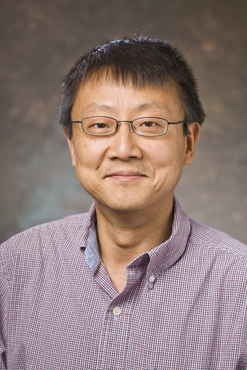
The Cancer Prevention & Research Institute of Texas (CPRIT) has awarded $6 million to UT Health San Antonio to support the recruitment of internationally known biochemist Patrick Sung, D.Phil.
Dr. Sung’s discoveries have increased understanding of how DNA can repair damage induced by radiation, carcinogens and other causes. Cancer cells are particularly effective at repairing their DNA, which makes them harder to kill. Hindering this capability is a major target for development of therapeutics.
Dr. Sung will occupy the Robert A. Welch Distinguished Chair in Chemistry and be appointed professor in the Department of Biochemistry & Structural Biology at UT Health San Antonio. Additionally he will serve as associate dean for research in the Joe R. & Teresa Lozano Long School of Medicine, and lead a new research program in genetic integrity at the Mays Cancer Center, the newly named home to UT Health San Antonio MD Anderson Cancer Center.
Dr. Sung currently is professor of molecular biophysics and biochemistry, therapeutic radiology and epidemiology at Yale University in New Haven, Conn.
Dr. Sung, a native of Hong Kong, earned a Bachelor of Science degree at the University of Liverpool in 1981 and a Doctor of Philosophy degree at the University of Oxford in 1985. Both degrees are in biochemistry. He then completed eight years of postdoctoral fellowship training at the University of Rochester in the laboratories of Drs. Louise and Satya Prakash.
His initial faculty appointment was at The University of Texas Medical Branch at Galveston. In 1997 he moved to UT Health San Antonio as assistant professor, and ultimately was promoted to professor and the Zachry Distinguished Professor of Molecular Medicine. From 2001 to 2003, he was co-director of a National Cancer Institute-funded training program in DNA repair at the university.
He left UT Health San Antonio in 2003 to join the Department of Molecular Biophysics & Biochemistry at Yale University. From 2009 to 2015, Dr. Sung served two three-year terms as chair of the department, which includes several National Academy of Sciences members and a Nobel laureate.
“Dr. Patrick Sung is an internationally recognized leader in the mechanistic biochemistry of DNA repair,” said Robert Hromas, M.D., dean of the Long School of Medicine and vice president for medical affairs at UT Health San Antonio. “He has more than 200 original research papers, and his work has been cited more than 1,000 times a year by his peers for the past 10 years.”
Dr. Sung was attracted to return to UT Health San Antonio by the institution’s existing research strength in DNA repair (in several laboratories, including the lab of Dr. Hromas), and the university’s capabilities for taking bench research and translating it into human application. Institutional assets to accomplish this include the Center for Innovative Drug Discovery, which is a partnership with The University of Texas at San Antonio, and the Mays Cancer Center, which is a National Cancer Institute-Designated Cancer Center.
Dr. Sung’s findings have ramifications for cancer research, particularly regarding drug development, said Ruben Mesa, M.D., director of the Mays Cancer Center.
The genome is the blueprint of each cell in every living thing and is found in a molecule called DNA. Forces such as ionizing radiation and chemical carcinogens continually challenge the integrity of this blueprint. DNA repair is a major mechanism protecting the blueprint’s stability.
“There are different forms of DNA repair, and the form Dr. Sung is well known for is called homologous recombination of double-strand DNA breaks,” Dr. Mesa said. “Homologous recombination is a major form of DNA damage that is induced by radiation and carcinogens.”
Bruce Nicholson, Ph.D., chairman of the Department of Biochemistry & Structural Biology, said Dr. Sung has deconstructed this form of DNA repair, isolated its components and put it back together. He has recapitulated it in a test tube to understand how it works.
“If you take a motor apart and put it back together, you understand it a lot better,” Dr. Nicholson said. “That’s essentially what Dr. Sung has done with molecules in this form of DNA damage.”
Dr. Sung plans to bring a lab team of more than a dozen members with him to San Antonio to hit the ground running in early 2019, Dr. Nicholson said.
“Dr. Sung’s recruitment represents a strong commitment by the Mays Cancer Center and UT Health San Antonio to bring the most cutting-edge research and cancer care to San Antonio,” Dr. Mesa said.
The University of Texas Health Science Center at San Antonio, now called UT Health San Antonio®, is one of the country’s leading health sciences universities. With missions of teaching, research, healing and community engagement, its schools of medicine, nursing, dentistry, health professions and graduate biomedical sciences have produced more than 33,000 alumni who are leading change, advancing their fields and renewing hope for patients and their families throughout South Texas and the world. To learn about the many ways “We make lives better®,” visit www.uthscsa.edu.

